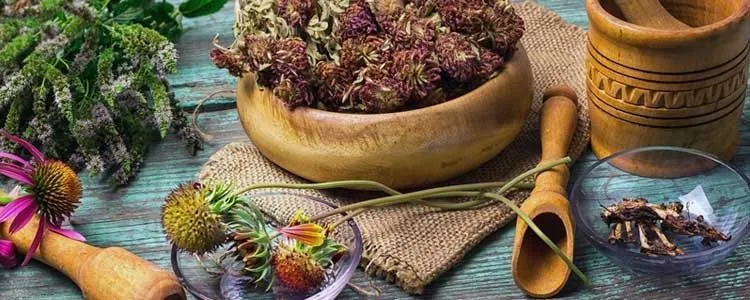Currently, the phytotherapy is experiencing a renaissance, and more and more people are convinced that medicinal herbs are as effective as medicines bought in pharmacies.
Modern phytotherapy deals with extracting pure substances with specific pharmacological properties and known physicochemical properties from plants. Thanks to this procedure, the dosage of herbal medicine is more accurate and effective.
Table of Contents
What is phytotherapy?
Phytotherapy or herbal medicine is based on the use of medicinal plants in the treatment of diseases. Natural medicine is not loaded with side effects as strong as those of conventional medicines, and at the same time provides valuable ingredients and vitamins to our body.
Preventive medicine and phytotherapy must go hand in hand. Herbal therapy prevents the occurrence of many diseases, strengthening the body and spirit.
How to prepare herbs for phytotherapy?
Dry plants are prepared depending on what part of them you need. Herbal medicine uses leaves, flowers, roots, and even bark. An infusion, decoction or maceration is made of leaves and flowers. From the root or bark.
Infusion, decoction and maceration. What is the difference between them?
Many people have already discovered that herbs can provide many more benefits than many syrups or tablets.
Phytotherapy and menopause
It is worth being interested in phytotherapy, it is even an alternative for the symptoms of menopause, with soy infusions.
- Infusion: a tablespoon of herbs is poured with a glass of boiling water and set aside for a few minutes. It can be stored, for example in a thermos.
- Decoction: herbs are poured with boiling water and cooked thoroughly.
- Maceration: herbs are poured with cold water. In a large flame they are brought to a boil, then the heat is reduced and cooked for 15 minutes.
Phytotherapy is nothing more than an herbal medicine, previously considered black magic, today it has become an element of medicine, herbs can be easily purchased in any pharmacy and even in the grocery store.

What cures phytotherapy?
With phytotherapy you can create a natural anti-inflammatory, but its benefits and uses are many. The following ailments can be treated with herbs:
Nausea: infusion of chamomile or alfalfa. Ginger root will also help. These herbs have digestive, relaxing and soothing properties.
Anxiety, insomnia – valerian, lemon balm, passion fruit, will certainly help with the thyroid.
Back pain: A bath with the addition of aromatic, lavender or rosemary oils, as well as chamomile oil or with the addition of geraniums will be beneficial.
Heartburn – which will be relieved with an infusion of the queen of the meadows, maceration of marshmallow root and decoction of licorice root.
Constipation: An infusion of chamomile, alfalfa or dandelion root decoction will help. Soak the flaxseed and eat it during the day.
Hemorrhoids: wash the area with extracts of calendula, witch hazel, mountain arnica and comfrey. Prepare a moisturizer with chestnut extract, marshmallow grass and witch hazel bark.
Anemia: decoctions of nettle, alfalfa, dandelion, sorrel root, as well as rosehip.
Herbs are widely used, so it’s worth checking out phytotherapy when we have common and problematic ailments.
Phytotherapy and medicinal herbs: how to use herbs?
Teas are the most popular form of herbal consumption. Prepared mixtures focused on specific actions are available in pharmacies and organic stores. Phytotherapy provides the best results when used regularly, several times a day.
Therefore, it is worth consuming your tea at least 2 times a day. Herbal medicine is a field that has no immediate effects. We will begin to feel the positive effects after a few months, which is why regularity is so important.
Making infusions is another popular method. Pour the herbs into a bowl or a large pot of hot water, then inhale nutritious steam. Of this manera, we clean our airways and fight against runny nose or cough.
Phytotherapy uses various herbs and roots, but some of them are particularly popular because of the richness of the nutrients they contain. Interestingly, most are well-known plants that we can find in our backyard.
Dandelion: the healing properties of this plant were known in ancient times. Modern phytotherapy uses its leaves, flowers and roots.
It has a positive effect on the liver and urinary tract, therefore, it is used to cleanse the body of toxins. Its composition includes ready herbal mixtures and herbal medicines.
It also affects the bones and joints, therefore, it is recommended to make compresses for people suffering from rheumatism. In case of skin problems, it is worth using natural dandelion masks.
Nettle: another plant that benefits medicinal herbs. Even though contact with its leaves can be unpleasant, the ingredients it contains will compensate for the pain and burning.
Phytotherapy uses nettle to detoxify the body, prevent disease, and strengthen immunity. How does phytotherapy, a natural anti-inflammatory, work? It has in its composition drugs used in geriatrics for arthritis, hemorrhoids and internal inflammations.
Due to its properties associated with reducing pressure and improving bone health. Nettle has a positive effect on the skin, improving its condition and appearance. For this reason, it is used in acne therapies.
Why do herbs have such a good effect on our health?
Herbs have an excellent effect on our body, due to the ingredients and medicinal substances found in them.
Essential oils, tannins, phytochemicals – all these substances mean that phytotherapy can effectively help us in the fight against numerous ailments.
Herbal treatments help us to support the body in the fight against numerous diseases, they also help us in the daily care of the skin and hair.
After all, natural medicine and cosmetics are very involved in the use of these herbs, in which it focuses on natural ingredients. Speaking of phytotherapy, one should not forget the use of medicinal plants for prevention.
